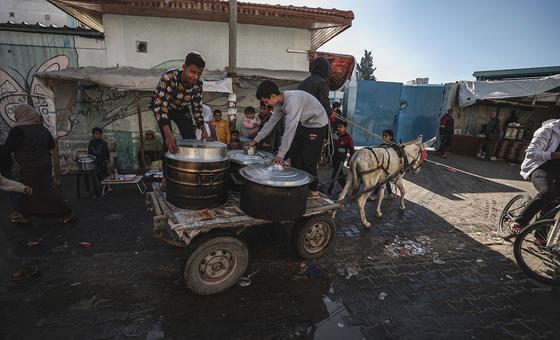Some Gazans are so desperate for food that they are now stopping aid trucks and immediately eating what they find, the head of the UN agency for Palestinian refugees warned on Thursday.
Briefing journalists in Geneva uon his return from Rafah governorate, Philippe Lazzarini, Commissioner-General of UNRWA, explained that people were “desperate, hungry and are terrified”, 69 days since the Israeli military bombardment began in response to the 7 October Hamas terror attacks in southern Israel.
Desperation, not diversion
Hunger is something Gazans have “never, ever experienced” in their troubled history, the veteran UN humanitarian continued. “I saw it with my eyes that people in Rafah have started to decide to help themselves directly from the truck out of total despair and eat what they have taken out of the truck on the spot…This has nothing to do with aid diversion.”
Only a significant upscaling of humanitarian relief to the enclave will help avoid a deepening of the already dire humanitarian situation there – and their sense of betrayal and abandonment by the international community – the UNRWA chief insisted, as he called for the reopening of the Kerem Shalom crossing from Israel to commercial vehicles and the lifting of the “siege” of Gaza.
Epicentre of displacement
Rafah governorate near the Egyptian border has now become the “epicentre of displacement” with more than one million people looking for shelter there, Mr. Lazzarini explained. UNRWA facilities are massively overcrowded, meaning that countless tens of thousands have “absolutely nowhere to go”.
“The lucky ones are those who have a place inside our premises,” he said, especially now that winter had begun. Those outside have to live in the open, “in the mud and under the rain”.
Fear of being forgotten
Mr. Lazzarini said that people in Gaza believe that their lives are “not equal to others’ lives” and that they have the feeling that “human rights, international humanitarian law does not apply to them”.
He highlighted the sense of isolation prevalent in the enclave, stressing that people there “just long for safety and stability”, wishing for a normal life which they are “very far away from right now”.
“What continues to shock me is the ever-increasing level of dehumanisation”, he said, deploring the fact that some can “cheer wrongdoing in this war…What is happening in Gaza should outrage everyone” and make us “rethink our values”, he insisted.
“This is a make or break moment for all of us and our shared humanity.”
Smear campaign
“I’m horrified at the smear campaign that targets Palestinians and those who provide aid to them”, he said, urging the media “help us push back at misinformation and inaccuracies” and stressing that fact-checking is key.
“In suffering there is no competition. Ultimately in this war there will be no winner, the longer it goes on the larger the loss and the deeper the grief.
“There is absolutely no alternative to a proper, genuine political process to end once and for all the longest-lasting unresolved political conflict, 75 years without resolution. It is time that this becomes a priority. Peace and stability – that’s what the region deserves.”

